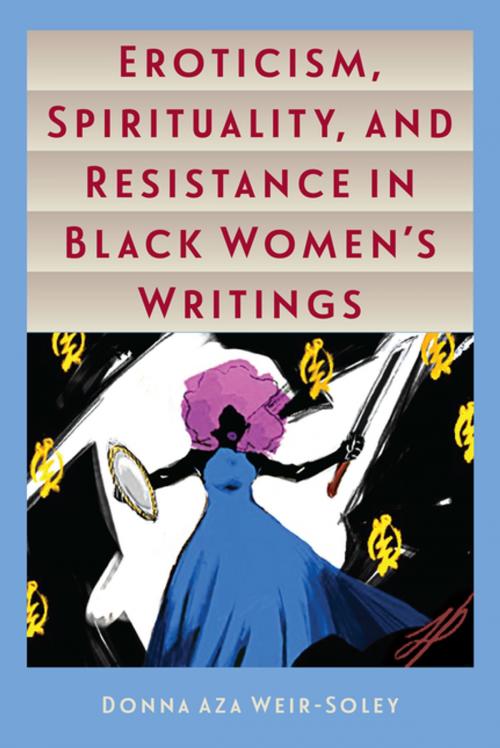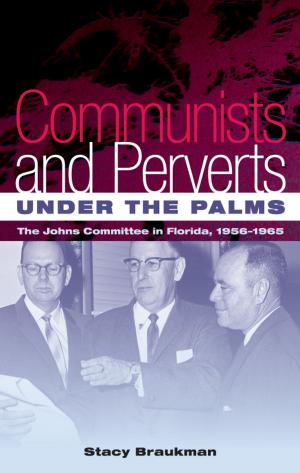Eroticism, Spirituality, and Resistance in Black Women's Writings
Fiction & Literature, Literary Theory & Criticism, Black, Women Authors, American| Author: | Donna Aza Weir-Soley | ISBN: | 9780813063195 |
| Publisher: | University Press of Florida | Publication: | June 13, 2017 |
| Imprint: | University Press of Florida | Language: | English |
| Author: | Donna Aza Weir-Soley |
| ISBN: | 9780813063195 |
| Publisher: | University Press of Florida |
| Publication: | June 13, 2017 |
| Imprint: | University Press of Florida |
| Language: | English |
"Provocative . . . articulates the importance of embodied, erotic spirituality to black female subjectivity and empowerment."--Tulsa Studies in Women's Literature "Sets out to reclaim the right of black women to their sexual and erotic expression untainted by the stereotypes and disparagements that have historically confined them."--African American Review "Captures one of the most challenging concerns of scholars who engage black women's literature, culture, and theory: the ongoing quest to locate a form of black female sexual agency that neither withers in the chilly lake of sexual repression nor explodes in the heat of hypersexual stereotypes."--MELUS: Journal of the Society for the Study of the Multi-Ethnic Literature of the United States "Successfully undertakes an analysis of how black women writers have used overlapping narrative depictions of sexuality and spirituality to recast the denigrated black female body and rewrite an empowered and fully actualized black female subject."--Candice M. Jenkins, author of Private Lives, Proper Relations: Regulating Black Intimacy "Weir-Soley speaks with an authority that comes from real knowledge of, investment in, and attention to the details of the African cosmologies and textual complexities she unearths."--Carine Mardorossian, SUNY-Buffalo "The most original and significant contributions are the often brilliant readings of Morrison, Adisa, and Danticat. The work is riveting, both methodologically and critically."--Leslie Sanders, York University Western European mythology and history tend to view spirituality and sexuality as opposite extremes. But sex can be more than a function of the body and religion more than a function of the mind, as exemplified in the works and characters of such writers as Zora Neale Hurston, Toni Morrison, Opal Palmer Adisa, and Edwidge Danticat. Donna Weir-Soley builds on the work of previous scholars who have identified the ways that black women's narratives often contain a form of spirituality rooted in African cosmology, which consistently grounds their characters' self-empowerment and quest for autonomy. What she adds to the discussion is an emphasis on the importance of sexuality in the development of black female subjectivity, beginning with Hurston's Their Eyes Were Watching God and continuing into contemporary black women's writings. Writing in a clear, lucid, and straightforward style, Weir-Soley supports her thesis with close readings of various texts, including Hurston's Their Eyes Were Watching God and Morrison's Beloved. She reveals how these writers highlight the interplay between the spiritual and the sexual through religious symbols found in Voudoun, Santeria, Condomble, Kumina, and Hoodoo. Her arguments are particularly persuasive in proposing an alternative model for black female subjectivity.
"Provocative . . . articulates the importance of embodied, erotic spirituality to black female subjectivity and empowerment."--Tulsa Studies in Women's Literature "Sets out to reclaim the right of black women to their sexual and erotic expression untainted by the stereotypes and disparagements that have historically confined them."--African American Review "Captures one of the most challenging concerns of scholars who engage black women's literature, culture, and theory: the ongoing quest to locate a form of black female sexual agency that neither withers in the chilly lake of sexual repression nor explodes in the heat of hypersexual stereotypes."--MELUS: Journal of the Society for the Study of the Multi-Ethnic Literature of the United States "Successfully undertakes an analysis of how black women writers have used overlapping narrative depictions of sexuality and spirituality to recast the denigrated black female body and rewrite an empowered and fully actualized black female subject."--Candice M. Jenkins, author of Private Lives, Proper Relations: Regulating Black Intimacy "Weir-Soley speaks with an authority that comes from real knowledge of, investment in, and attention to the details of the African cosmologies and textual complexities she unearths."--Carine Mardorossian, SUNY-Buffalo "The most original and significant contributions are the often brilliant readings of Morrison, Adisa, and Danticat. The work is riveting, both methodologically and critically."--Leslie Sanders, York University Western European mythology and history tend to view spirituality and sexuality as opposite extremes. But sex can be more than a function of the body and religion more than a function of the mind, as exemplified in the works and characters of such writers as Zora Neale Hurston, Toni Morrison, Opal Palmer Adisa, and Edwidge Danticat. Donna Weir-Soley builds on the work of previous scholars who have identified the ways that black women's narratives often contain a form of spirituality rooted in African cosmology, which consistently grounds their characters' self-empowerment and quest for autonomy. What she adds to the discussion is an emphasis on the importance of sexuality in the development of black female subjectivity, beginning with Hurston's Their Eyes Were Watching God and continuing into contemporary black women's writings. Writing in a clear, lucid, and straightforward style, Weir-Soley supports her thesis with close readings of various texts, including Hurston's Their Eyes Were Watching God and Morrison's Beloved. She reveals how these writers highlight the interplay between the spiritual and the sexual through religious symbols found in Voudoun, Santeria, Condomble, Kumina, and Hoodoo. Her arguments are particularly persuasive in proposing an alternative model for black female subjectivity.















